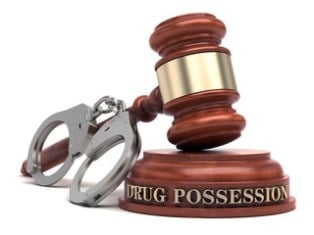Illegal drug possession in Virginia, Washington, D.C., and Maryland carries stiff penalties and can have devastating consequences, even for a first offense. Possession of just a small amount of marijuana may result in a misdemeanor conviction, creating a criminal record that can limit future employment and educational opportunities. Felony charges stemming from the possession of other controlled substances such as cocaine, heroin, or methamphetamine may lead to a conviction involving serious prison time. 
Drug Possession
Virginia Code 18.2-250 criminalizes the possession of a controlled substance if you lack a valid prescription. In Virginia, a drug must be within your control for you to be considered in possession of it. A substance is considered to be within your control if you’re the primary individual who has access to it. This means you may be charged with drug possession for illegal substances found on your person, in your vehicle, or in your home. Courts have held that if you enter a space that did not contain any drugs when you entered, but drugs were there when you left, it can be evidence of possession.
Drug Possession Penalties
Virginia divides controlled substances into six schedules, classifying them by their level of addiction potential and the harm they may cause:
- Schedule I drugs are considered to be the most addictive and harmful and have not been approved for medical use in the United States. This classification includes illicit drugs such as heroin, Ecstasy, and LSD. Possession of these drugs is a Class 5 felony, with the potential of a decade-long prison sentence and fines of up to $2,500.
- Schedule II drugs also have considerable addiction potential, although some of these drugs are used in the medical field. Drugs in this schedule include hydrocodone, morphine, opium, codeine, methadone, and oxycodone. Possession of these drugs is also considered a Class 5 felony, with up to 10 years in prison and as much as $2,500 in fines.
- Schedule III drugs have less potential for abuse than those in the first two schedules, although there is still a high risk of psychological dependence. These drugs are frequently prescribed by medical professionals and include Vicodin, Tylenol with Codeine, and steroids. Illegal possession of these drugs constitutes a Class 1 misdemeanor, with a potential jail sentence of up to 12 months and fines of up to $2,500.
- Schedule IV drugs are prescription substances with a relatively low potential for addiction. These include Xanax, Valium, and Ativan. Illegal possession of these drugs constitutes a Class 2 misdemeanor, with penalties of up to 6 months in jail and $1,000 in fines.
- Schedule V drugs contain small quantities of narcotics and have limited potential for abuse. These are primarily cold medications that include codeine. Illegal possession of these drugs is considered a Class 3 misdemeanor, with a $500 fine.
- Schedule VI drugs include substances that are sometimes abused recreationally. The addiction risk is generally considered quite low. These primarily include inhalants such as those found in spray paint and other types of aerosol cans. This is a Class 4 misdemeanor charge with a fine of up to $250.
Marijuana possession is illegal in Virginia. The first offense of marijuana possession is considered a misdemeanor. It is punishable by up to 30 days in jail and a fine of up to $500. An individual with a prior marijuana possession conviction faces up to a year in jail and a fine of up to $2,500 if convicted of a subsequent offense.
You Need an Attorney
Enforcement of Virginia’s drug possession laws is extremely aggressive, with serious long-term consequences in the event of a conviction. If you’re facing a drug possession charge, you need representation by an experienced legal professional who understands how to protect your rights. Contact the attorneys of Kearney, Freeman, Fogarty & Joshi, PLLC by using the form on this page.
|
Related links: |

